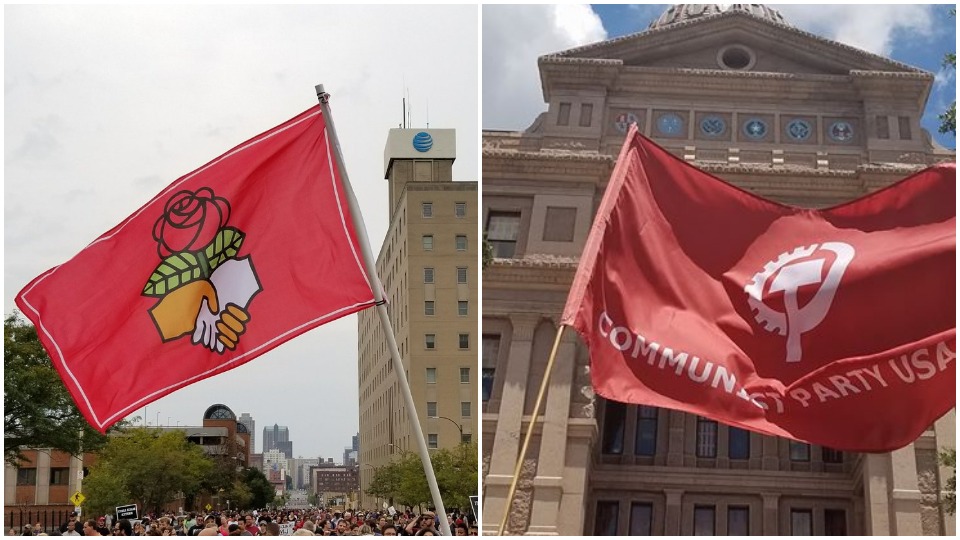
Recently, there seems to have developed a certain anxiety on the part of some party members concerning the rising fortunes of social democracy in our country. In a few pre-convention discussion pieces and in comments made at various national meetings, worries have been expressed that the CPUSA is not doing enough to differentiate itself from social democrats.
With the Sanders campaign of 2016 and the meteoric growth of DSA, some fear that the party has not adequately gotten across to newly-radicalized activists what sets it apart.
I think some of these concerns are valid, but if carried too far, they could present some danger.
Ideologically, there is indeed a difference between the long-term visions of social democracy and scientific socialism as understood in the tradition of Marx, Engels, and Lenin. Essentially, one doesn’t have a long-term vision and the other does. But to be more precise, the fundamental distinction, of course, revolves around the old dispute between reform and revolution.
For social democracy as it came to develop in the 20th century, improving the social, economic, and political system so that it’s fairer for working people was the purpose of political action. Essentially, as long as things were getting better, then that’s what really matters. More equality is good, more democracy is good. The final destination wasn’t all that important to debate or think about.
Communists don’t denigrate reforms, but they do think about them in a different way. Reforms under capitalism help alter the relationship of forces, shifting the balance more and more in favor of the working class, raising class and political consciousness, and ultimately paving the way for revolutionary change. From the Marxist viewpoint, struggles for day-to-day improvements—whether for wages, better jobs, against racism, to protect voting rights, etc.,—are akin to basic training for the long-term journey toward working-class political power.
What distinguishes the Communist Party is that it does see a destination on the horizon: socialism. The party believes that a different kind of society is necessary, not just a vaguely fairer one, but one where every aspect of life is democratized. Its scientific analysis of history and human development—historical materialism—shows that long-term social advance requires (and will produce) a society where the many take political and economic power away from the few.
In the United States, the path to that future is through the determined and widening struggle for ever-more progressive and radical measures, always focused on increasing the power of the working class and oppressed peoples to determine the course of development. The crowning achievement of that democratic struggle for a better life is socialism.
So, yes, the Communist Party is clearly different than DSA or the other left and radical groups out there.
But in the eagerness to promote the Communist Party and make the case for its advanced view, there is a danger that some will go so far as to make social democrats the enemy. In the process, they could end up not only turning away important allies in the wider left and progressive movement, but also turning off those who are new to political activism and are not yet familiar with all these ideological distinctions.
The capitalist crisis that exploded with the 2008-09 financial meltdown (and its after effects, including, at least partially, Trump’s election) permanently destabilized the neoliberal economic model that had prevailed since roughly the 1980s. A whole new generation is entering the workforce burdened with dead-end jobs, low wages, and mountains of student debt. In such circumstances, anyone who is ready to question the capitalist system and get involved in movements to do something about it is an ally to be embraced. (As are the many who are not even to the point of questioning capitalism but know injustice when they see it.)
There seems to be a fear among some of party members, however, of some looming reformist danger. They feel the need to urgently proclaim the CPUSA is more revolutionary and therefore better, as if there was a revolution in danger of betrayal. Naturally, one would assume that members of the Communist Party are going to think it’s the best outlet for their activism. But carried too far, declaring the party’s superiority could end up isolating party members from the bigger movements that need their input and leadership.
Going in that direction, some want to make the party so supposedly revolutionary that they would dump the policy of the “People’s Front,” which has been the foundation of the Communist Party’s strategic approach for over 80 years.
At the core of the popular front strategy is the idea of broad-based coalition politics, formulated around a couple of key questions. First, it asks what goal, if won, can change the relationship of forces and open up the possibility for advance. Second, it sets out who are the main opponents and possible allies in the struggle to achieve that goal. This means determining who has the self-interest to fight for the goal and assessing their organization, consciousness, and capacity to join in the fight.
In the 1930s, the goal was stopping fascism and defeating the anti-New Deal section of capital and the Republican Party. Today, with the whole federal government and many states under the control of Trump and the GOP, our task appears in similarly stark terms. To build resistance to the far-right corporate agenda, there is a need to consolidate the widest possible unity—not leaving out any possible ally.
At a time when masses of people are moving left, challenging corporate power, and viewing the concept of socialism more favorably than we’ve seen in decades—or perhaps ever—there would be no greater mistake than to expend unnecessary effort critiquing people for not being “left enough.”
It is certainly necessary for the CPUSA improve its explanation of what makes it unique, but we have to always remember who the real enemy is.
It’s not the followers of Bernie Sanders, that’s for sure.


 Join Now
Join Now